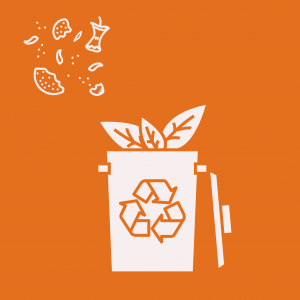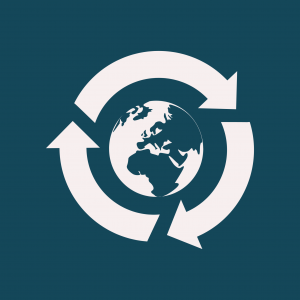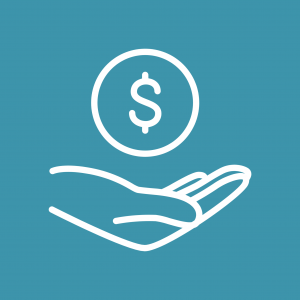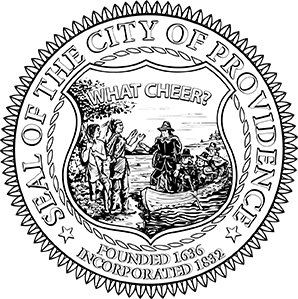
We need to build a sustainable, zero-waste economy in Providence, one in which we produce and consume to live well without living better at the expense of others, with a focus on supporting local businesses and creating meaningful work for local frontline community members.
How we produce, consume and dispose of everyday items such as food, clothing and electronics has farreaching environmental, economic and social impacts. A study published in 2015 by the Journal of Industrial Ecology shows that household consumption of food and material goods is responsible for up to 60 percent of global greenhouse gas emissions.
How Will We Get There?
Targets
By 2040, eliminate food waste in Providence.
Eliminate contaminated recycling by 2030.
Increase Residential Recycling Rate to 30% by 2020.
Meet annual targets of 10% of City spending in municipal purchases of goods and services from state-certified women-owned enterprises and 10% of City spending in municipal purchases of goods and services from state-certified minority-owned enterprises as outlined in City ordinance.
Targets to Develop
Increase number of enterprises in Providence that are democratically controlled and operated by their own workers.
Increase partnerships with frontline community organizations for workforce training.
Expand training and educational opportunities offered through the PVD Self Employment Program for unemployed and underemployed Providence residents, specifically for frontline communities.
Increase investments from the Providence Business Loan Fund that are supporting enterprises that are engaging in a circular and regenerative economy, specifically to people of color in Providence.
Strategies
Create workforce development programs to support a just transition away from fossil fuels.
Strengthen City policies supporting local frontline community workers and businesses.
Create employment pipelines for local residents to work at the port.
Create recognition program for local businesses that are composting and engaging in responsible waste management.
Increase carbon sequestration in soils through composting.
Explore a city-wide community composting program and other food waste reduction strategies.
 Providence’s Retail Plastic Bag Ban
Providence’s Retail Plastic Bag Ban
The ban seeks to reduce the number of plastic checkout bags in the City, curb litter in the streets, protect our waterways and marine environment while reducing greenhouse gas emissions through encouraging the use of reusable bags by prohibiting retailers from offering single-use plastic bags at the checkout counter
The ordinance went into effect on October 22, 2019.
Retail Plastic Bag Ban: What You Need to Know
 Composting
Composting
Without healthy soil, it is harder to grow the food we need and the actual nutritional value of our food goes down. At the same time, our soils are valuable shields in the fight against climate change; they contain more carbon than all above-ground vegetation and help store and regulate greenhouse gas emissions. Our planet’s soils are rapidly degrading; turning Providence’s wasted food into soil-supporting compost for local farmers can create jobs, turns waste into a valuable resource, supports Rhode Island farms and food businesses and is a key component to creating a circular, regenerative economy.
Composting Services in Providence SustainPVD: Food
 Reduce, Reuse, Recycle Right
Reduce, Reuse, Recycle Right
Many everyday items such as single-use plastics, fast fashion clothing and accessories, and our food choices – have hidden environmental and human health costs at every stage of their life cycle: from extraction of raw materials, to processing, to transportation, to packaging, and of course, to how we get rid of those items.
Rhode Island’s landfill is expected to reach capacity by 2034 (likely sooner). Through proper recycling habits, combined with waste reduction strategies like composting, we could double the life of our landfill while creating new useful items from re-purposed materials.
For more information about where you can recycle special items (electronics, furniture, clothing, etc), visit the Rhode Island Resource Recovery Corporation website here.
What You Can Recycle in your Curbside Cart PVD’s Recycling Office Zero Waste PVD Community Group
 Economic Opportunity
Economic Opportunity
Providence’s Office of Economic Opportunity can help the City’s low-income and unemployed residents gain skills and credentials needed to succeed in the 21st Century economy, reduce income inequality, and break the cycle of inter-generational poverty in the City of Providence.
Connecting art, food, health, and economic prosperity in Southside and the West End, Sowing Place is a creative placemaking initiative organized by the Department of Art, Culture + Tourism in partnership with the Providence Healthy Communities Office, the African Alliance of Rhode Island, West Elmwood Housing Development Corporation’s Sankofa Initiative, and Southside Cultural Center of Rhode Island.
Office of Economic Opportunity

